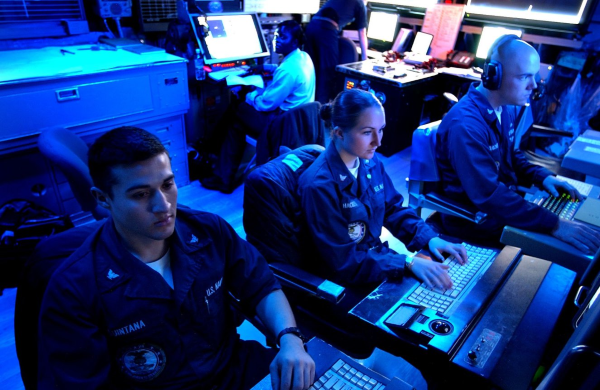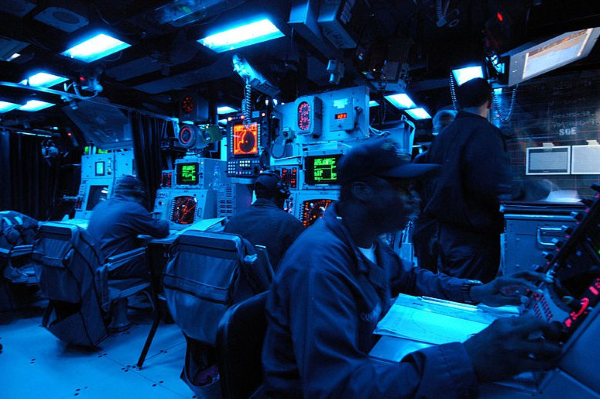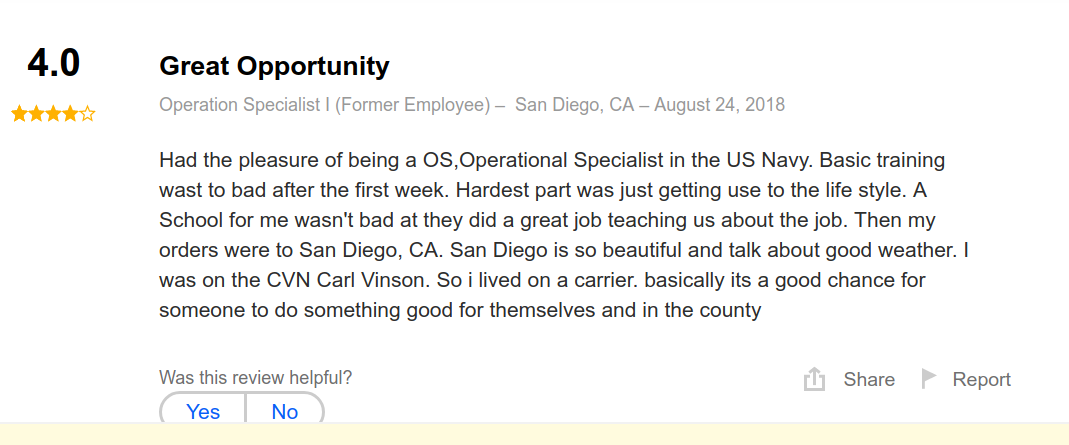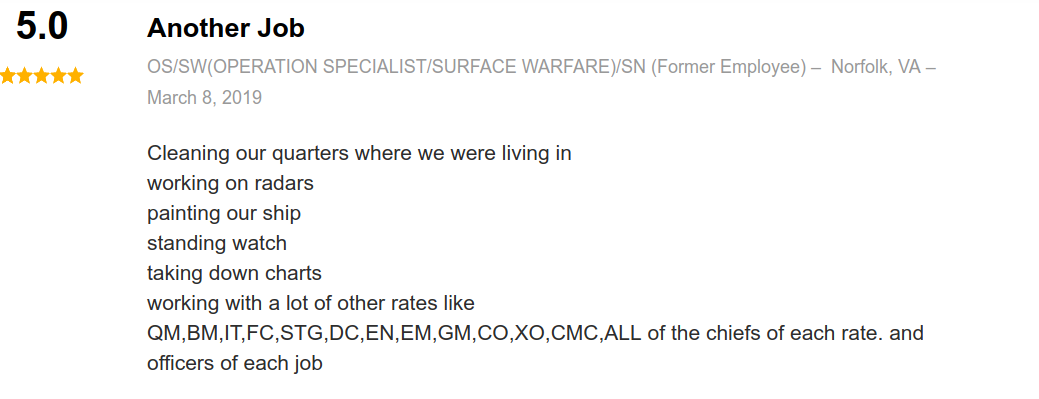Navy Operations Specialists (OS) find that they’re key members of the combat team on Navy vessels in the fleet.
These enlisted personnel are responsible for locating, identifying, and tracking potential targets using sophisticated electronic devices.
Specific jobs a Navy Operations Specialist performs include plotting ship position, heading, and speed and operating marine navigational instruments.

The Navy Operations Specialist’s responsibilities and duties vary depending on their ship’s equipment and the ship’s mission.
They may handle shipboard communication or perform surveillance duties that include identifying enemy aircraft and vessels.
They operate the Navy’s “Identification Friend or Foe” radar system. Additionally, they may find themselves serving as an air traffic controller for Navy rotary and fixed-wing aircraft in their ship’s vicinity.
A Navy OS is never without a lack of work.
Related Article – Navy Jobs List: A List Of All 89 Ratings In The Navy
Navy Operations Specialists normally work inside the Combat Information Center (CIC)/Combat Direction Center (CDC).
Whatever the specific mission, the Navy charges Navy Operations Specialists with disseminating and displaying tactical information.
Such operations may include:
- Search and Rescue (SAR) operations
- Air Warfare (AW), Surface Warfare (SUW)
- Amphibious Warfare (AMW)
- Ballistic Missile Defense (BMD)
- Littoral Warfare (LW)
- Undersea Warfare (USW)
- Mine Warfare (MIW)
- Naval Surface Fire Support (NSFS).

Jump To A Section
Requirements and Qualifications
To become a Navy OS, there are specific requirements and qualifications that you must meet:
- Must be between the ages of 17 and 41
- You must be a US Citizen.
- Must demonstrate normal hearing and have no speech impediment.
- You will need normal color perception.
- No record of adversely adjudicated drug abuse offenses.
- Must have an Armed Forces Vocational Aptitude Battery (ASVAB) score of VE (Verbal Expression)+ MK (Mathematics Knowledge) + CS (Coding Speed) = 148 or AR (Arithmetic Reasoning) + 2MK (Mathematics Knowledge) + GS (General Science) = 198
- Must be able to meet all security clearance requirements (Secret Clearance is the minimum).
Related Article: Navy Height And Weight Standards
Training and Career Path
Prior to becoming a Navy OS, you must first become a US Navy Sailor via successful completion of Recruit Training, commonly referred to as Boot Camp.
All sailors attend Boot Camp at the Recruit Training Command, Great Lakes (RTC Great Lakes).
Commonly referred to as “The Quarterdeck of the Navy,” RTC Great Lakes is located at Naval Station Great Lakes in North Chicago, Illinois, in Lake County.
Boot Camp is 10 weeks long. During these 10 weeks, the Navy will teach you the basic skills required of all US Sailors.
Related Article – Is Navy Boot Camp Hard?
Navy Operations Specialist Class “A” School
After boot camp, Navy Operations Specialists head across Naval Station (NAVSTA) Great Lakes to Naval Service Training Command (NSTC) Great Lakes where they attend Operations Specialist Class “A” school.
Navy Operations Specialist Class “A” school is 10 weeks long.
During Navy Operations Specialist ” A” School training, sailors learn pertinent subjects from a combination of classroom, computer-aided, and group instruction.
These include:
- Charts and course-plotting
- Tactical publications
- Radar operations
- Vector analysis
- Naval tactical data systems’ basic procedures, detection, tracking, and interpretation
- Radiotelephone coding
- Air and surface status board keeping
- Anti-warfare plotting
Just recently, many wanna-be Operations Specialists took part in the Navy’s innovative initiative known as Ready, Relevant, Learning (RRL).
With Ready, Relevant, Learning, instead of attending Operations Specialist “A” school sailors self-study pier side via interactive, self-directed courseware, step-by-step guides, demonstration videos, and game-based virtualization software during a sailor’s career dependent on specific skills required.
Navy Operations Specialists must commit to a two or five-year service obligation.
Besides Operations Specialist Class “A” school, the Navy expects and encourages Operations Specialists to complete additional self-paced learning opportunities.
Non-Resident Training Courses (NRTC) and relative Personnel Qualification Standards (PQS) will enhance their knowledge and increase their promotion opportunities.
In addition, The Navy provides online training to qualified Navy Operations Specialists through their Credentialing Opportunities On-Line website, referred to as Navy COOL.
There also exists Navy Operations Specialist-related Class “C” schools for more senior, high-performing Navy Operations Specialists interested in further training.
How Much Are Navy Operations Specialists Paid?
Like all other enlisted personnel (in all branches), the Navy bases a sailor’s pay on their rank and length of service.
| Insignia | Pay Grade | Rank | Abbreviation | 2023 Minimum Monthly Pay |
|---|---|---|---|---|
| N/A | E-1 +4 months | Seaman Recruit | SR | $1,917.60 |
| E-2 | Seaman Apprentice | SA | $2,149.20 | |
| E-3 | Seaman | SN | $2,259.90 | |
| E-4 | Petty Officer Third Class | PO3 | $2,503.50 | |
| E-5 | Petty Officer Second Class | PO2 | $2,730.30 | |
| E-6 | Petty Officer First Class | PO1 | $2,980.50 | |
| E-7 | Chief Petty Officer | CPO | $3,445.80 | |
| E-8 | Senior Chief Petty Officer | SCPO | $4,957.20 | |
| E-9 | Master Chief Petty Officer | MCPO | $6,055.50 | |
| E-9 | Command Master Chief Petty Officer | CMDCM | $6,055.50 | |
| E-9 | Master Chief Petty Officer Of The Navy | MCPON | $6,055.50 |
A Navy OS may also qualify for other forms of compensation including Basic Allowance for Housing (BAH), Basic Allowance for Subsistence (BAS), and billet pay (sea pay, flight pay, submarine pay, hazardous duty pay, etc.) if eligible.
Related Article: Navy Ranks And Pay For 2019
What’s Life Like as a Navy Operations Specialist?
Navy Operations Specialists normally work in the Combat Information Center (CIC) or Combat Direction Center (CDC) on board their respective ships.
Cool and air-conditioned (albeit dimly it), the CIC/CDC is the “tactical nerve center” of the ship.
A Navy OS uses a wide variety of assets available to them in the CIC/CDC to help collect and organize data.
Their primary responsibility is to process and evaluate it and disseminate any relevant tactical combat information to their leaders. This is so those leaders can make sound tactical decisions in a minimal amount of time.

During military operations, the CIC/CDC is often fast-paced and stressful for Navy Operations Specialists.
A Navy OS has jobs that fall in one of five categories:
- Navigation and Plotting Specialists
- Operations Administrator
- Warfare Operator
- Electronic Systems Operator
- Combat Air Controller
Navy Operations Specialists should, however, expect, that they will perform one or more, or even all, of these roles, depending on the size of their duty station and the needs of the command and Navy.
Related Article – Navy Air Traffic Controller: Pay, Duty Stations, and More
Day-to-Day Duties for a Navy OS
The duties of a Navy OS are vast and depend on the ship or duty station to which they’re assigned. Some of these duties are:
- Provide command-relevant and timely information related to operations. These may be Search and Rescue missions or Air, Surface, or Amphibious Warfare operations.
- Plotting ship’s positions, headings, and speed to identify vessels or aircraft.
- Provide target plotting data based on information obtained from target tracking devices.
- Assist and direct air control of combat aircraft.
- Plot targets and make calculations to adjust fire during naval gunfire support missions
- Operate radar systems and other electronic navigation and communications equipment.
- Maintain a tactical ‘picture’ of the ship’s surroundings, including friendly, neutral, hostile, and civilian activities.
Operations Specialists must also maintain a working knowledge of protocols and procedures in electronic warfare.
As Operations Specialists advance in their careers, the Navy depends on them to lead and supervise less senior Operations Specialists in their Department and/ or Division.
It is also likely that Operations Specialists will need to qualify for higher-level clearances, such as Top Secret or Top Secret SCI (Sensitive Compartmented Information), as their rank and responsibilities increase.
Sailors in specific jobs (or rates, as the Navy refers to them) must adhere to a Sea/Shore rotation based on their rate.
Navy OS is a sea-duty intensive rating. Navy Operations Specialists typically spend three-fifths of a 20-year career assigned to sea duty.
Typical Rotation
Specifically, the Navy OS Sea/Shore rotation is:
| Tour | Sea Tour | Shore Tour |
|---|---|---|
| First Tour | 54 Months | 36 Months |
| Second Tour | 60 Months | 36 Months |
| Third Tour | 48 Months | 36 Months |
| Fourth Tour | 48 Months | 36 Months |
| Fifth Tour | 36 Months | 36 Months |
| Sixth Tour | 36 Months | 36 Months |
| Seventh Tour | 36 Months | 36 Months |
Sailors who have completed four sea tours will serve 36 months assigned to a ship followed by 36 months assigned to a shore location until retirement.
Note that some overseas assignments count as sea tours.
Life aboard ship and life while on shore duty will be drastically different and the Navy expects Operations Specialists to adapt and meet the challenges presented by these different environments.
Navy Operations Specialists will find that they enjoy a cool, clean, comfortable work environment, opportunities to travel the world, great and varied benefits, unlimited opportunities for learning and advancement, and control over their careers.
Here are a few reviews we happened across on indeed.com for a Navy OS:



Noteworthy is that Navy Operations Specialists, like all other Navy rates, are sailors first.
Operations Specialists have collateral duties which may include standing watches, working parties, firefighting duties, damage control duties, and other various tasks as assigned by the chain of command.
Civilian Career Opportunities
Civilian Career Opportunities abound for a Navy OS when they leave or retire from the Navy.
This is especially true if the sailor takes full advantage of on-the-job (OJT) training and educational opportunities afforded them during their service.
Civilian occupations for Navy Operations Specialists include, but are not limited to:
- Computer Operator
- Intelligence Analyst
- Radio Operator
- Air Traffic Controller
- Electronics Engineer
- Remote Sensing Scientist/Technologist
- Airfield Operations Specialist
If you are a young person considering joining the US Navy, life as a Navy OS offers a fast-paced, adventurous life in uniform, along with a plethora of opportunities as a sailor.
After a successful contract with the Navy, there will also be opportunities later in life, as a civilian.
References
Navy Operations Specialist Salary Info
Navy Operations Specialist Reviews
Civilian Careers Similar To Navy Operations Specialist
- Gas Turbine Systems Technician (GSM and GSE): Career Details - June 18, 2024
- Interior Communications Electrician (IC): 2023 Career Details - June 18, 2024
- Religious Program Specialist (RP): 2023 Career Details - June 18, 2024

